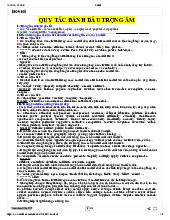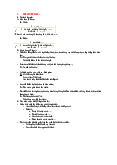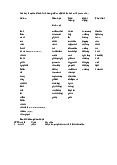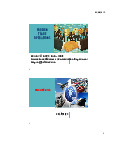






Preview text:
RELATIVE CLAUSES
I. Các đại từ quan hệ:
1. WHO: ….. N (person) + WHO + V + O (làm S trong MĐQH, thay thế cho danh từ chỉ người)
Ex: I told you about the woman who lives next door.
2. WHOM: …..N (person) + WHOM + S + V (làm O cho động từ trong MĐQH, thay thế cho danh từ chỉ người)
Ex: I was invited by the professor whom I met at the conference.
3. WHICH: ….N (thing) + WHICH + V + O / ….N (thing) + WHICH + S + V
(làm S hoặc O trong MĐQH, thay thế cho danh từ chỉ vật) Ex:
Do you see the cat which is lying on the roof?
He couldn’t read the book which he borrowed from me. 4. THAT:
- có thể thay thế cho vị trí của who, whom, which trong MĐQH xác định (MĐQH ko có dấu phẩy)
* Các trường hợp thường dùng “that”:
- khi đi sau các hình thức so sánh nhất
- khi đi sau các từ: the only, the next, the last, the 1st/2 /3 nd rd…
- khi danh từ đi trước bao gôm cả người và vật
- khi đi sau các đại từ bất định, đại từ phủ định, đại từ chỉ số lượng: no one, nobody, nothing, anyone,
anything, anybody, someone, something, somebody, all, some, any, little, none.
Ex: He was the most interesting person that I have ever met.
It was the first time that I heard of it.
These books are all that my sister left me.
She talked about the people and places that she had visited.
* Các trường hợp không dùng that:
- trong MĐQH không xác định (MĐQH có dấu phẩy) - sau giới từ
5. WHOSE: …..N (person, thing) + WHOSE + N + V ….
- dùng để chỉ sở hữu cho danh từ chỉ người hoặc vật, thường thay cho các từ: her, his, their, hoặc hình thức sở hữu cách.
Ex: Do you know the boy whose mother is a nurse? (the boy’s mother is a nurse)
II. Các trạng từ quan hệ
1. WHY: …..the reason + WHY + S + V …
- mở đầu cho MĐQH chỉ lý do, thường thay cho cụm for the reason, for that reason.
Ex: I don’t know the reason. You didn’t go to school for that reason.
→ I don’t know the reason why you didn’t go to school.
2. WHERE: ….N (place) + WHERE + S + V ….(WHERE = ON / IN / AT + WHICH)
- thay thế từ chỉ nơi chốn, thường thay cho there, on/in/at + N(place)
Ex: a/ The hotel wasn’t very clean. We stayed at that hotel.
→ The hotel where we stayed wasn’t very clean.
→ The hotel at which we stayed wasn’t very clean.
3. WHEN: ….N (time) + WHEN + S + V …(WHEN = ON / IN / AT + WHICH)
- thay thế từ chỉ thời gian, thường thay cho từ then, on/in/at + N(time)
Ex: Do you still remember the day? We first met on that day.
→ Do you still remember the day when we first met?→ Do you still remember the day on which we first met?
I don’t know the time. She will come back then. → I don’t know the time when she will come back. Van anh Tran_0909.961.960 Grade 11
* MĐQH không hạn định (Non-defining relative clauses): là mệnh đề cung cấp thêm thông tin về một
người, một vật hoặc một sự việc đã được xác định. Mệnh đề không xác định là mệnh đề không nhất thiết
phải có trong câu, không có nó câu vẫn đủ nghĩa. Nó được sử dụng khi danh từ là danh từ xác định và được
ngăn cách với mệnh đề chính bằng một hoặc hai dấu phẩy (,).
Ex: Dalat, which I visited last summer, is very beautiful. (Non-defining relative clause)
Note: để biết khi nào dùng MĐQH không xác định, ta lưu ý các điểm sau:
- Khi danh từ mà nó bổ nghĩa là một danh từ riêng (chỉ tên người, tên địa danh, tên bệnh…)
- Khi danh từ mà nó bổ nghĩa là một danh từ đi với một tính từ sở hữu (my, his, her, their) hoặc sở hữu cách
- Khi danh từ mà nó bổ nghĩa là một danh từ đi với this , that, these, those
IV. Một số lưu ý trong MĐQH
1. Nếu trong MĐQH có giới từ thì giới từ có thể đặt trước hoặc sau MĐQH (chỉ áp dụng với whom và which.)
Ex: Mr. Brown is a nice teacher. We studied with him last year.
→ Mr. Brown, with whom we studied last year, is a nice teacher.
→ Mr. Brown, whom we studied with last year, is a nice teacher.
2. Có thể dùng which thay cho cả mệnh đề đứng trước, bắt buộc phải có dấu phẩy giữa 2 mệnh đề.
Ex: She can’t come to my birthday party. That makes me sad. → She can’t come to my birthday party, which makes me sad.
3. Ở vị trí túc từ, whom có thể được thay bằng who.
Ex: I’d like to talk to the man whom / who I met at your birthday party.
4. Trong MĐQH xác định, chúng ta có thể bỏ các đại từ quan hệ làm túc từ (whom, which)
Ex: The girl you met yesterday is my close friend. The book you lent me was very interesting.
5. Các cụm từ chỉ số lượng some of, both of, all of, neither of, many of, none of … có thể được dùng trước
whom, which và phải có dấu phẩy.
Ex: I have two sisters, both of whom are students.
She tried on three dresses, none of which fitted her. V.
Cách rút gọn MĐQH
1. MĐQH được rút thành cụm phân từ: (V-ing/V3/ed)
MĐQH chứa các đại từ quan hệ làm S (who, which, that) có thể được rút gọn thành cụm hiện tại phân từ (V-
ing) hoặc quá khứ phân từ (V3/ed).
* Nếu MĐQH là mệnh đề chủ động thì rút thành cụm hiện tại phân từ (V-ing). Ex:
a/ The man who is standing over there is my father. → The man standing over there is my father.
b/ The couple who live next door to me are professors. → The couple living next door to me are professors.
* Nếu MĐQH là mệnh đề bị động thì rút thành cụm quá khứ phân từ (V3/ed). Ex:
The instructions that are given on the front page are very important.
→ The instructions given on the front page are very important.
2. MĐQH được rút thành cụm động từ nguyên mẫu:
MĐQH được rút thành cụm động từ nguyên mẫu (To-infinitive) khi
- trước đại từ quan hệ có các cụm từ: the first, the second, the last, the only hoặc hình thức so sánh bậc nhất. Ex:
a/ John was the last person that got the news.
→ John was the last person to get the news. Van anh Tran_0909.961.960 Grade 11
c/ He was the second man who was killed in this way.
→ He was the second man to be killed in this way.
***b/ He was the best player that we admire (= that is admired).
→ He was the best player to be admired.
- mệnh đề quan hệ chỉ mục đích, việc cần làm.
Ex: We need to find a place where we can stay at night.
→ We need to find a place to stay at night. (chỉ mục đích)
RELATIVE CLAUSES PRACTISE
I. Complete each sentence using relative pronouns/adverbs,
add commas if necessary .
1. We’ll soon gather at the village where/ at which the festival is taking place (at the village).
2. Do you know the name of the tourist who came and talked about New Year in Canada?
3. I’m looking for a book which tells about traditional festival of Asian peoples.
4. I couldn’t go to the show which was held in Hanoi last summer.
5. This is the photo of the hero our teacher talk whom about in the lecture.
6. My brother has told me about the festival which is held in Hue city every two years.
7. I recently visited school where/ at which I used to study five years ago.
8. I couldn’t understand the dance which (O) I saw at the festival last spring.
9. I’m really interested in the present which you gave me on my birthday.
10. Have you seen the photos which I took at the camp last week?
11. Last week we went to Hue, which is the ancient capital of Viet Nam.
12. The woman who lives next door to us is the weather caster on the local TV station.
13. The shoes which I bought were made in Italy.
14. What is the name of the lady who was wearing the gold dress?
15. Ha long Bay, which consists of hundreds of beautiful islands, is the world’s heritage.
16. The cat whose tail (N độc lập) is long doesn’t belong to me.
17. Show me the place where the ship sank.
18. Jack London, who wrote “the Call of the Wild”, is a famous American writer.
19. This is the house where he used to live.
20. Next summer holiday, our family will go to Da Lat, where my sister is living.
II. Combine sentences using relative pronouns
1. Manchester is the largest city in USA. My brother lives there.
Manchester, where my brother lives, is the largest city in USA.
2. I’ve recently gone back to the town. I was born in the town.
I’ve recently gone back to the town in which/where I was born.
I’ve recently gone back to the town which I was born in.
3. Do you know the name of the hotel? John is staying at the hotel.
Do you know the name of the hotel which John is staying at?
Do you know the name of the hotel at which/where John is staying?
4. We enjoy the city. We spent our vacation there.
We enjoyed the city where we spent our vacation.
5. We enjoy this city. It has been renewed a lot after the war.
We enjoyed this city, which has been renewed a lot after the war.
6. 4th June is the day. I was born on that day.
4th June is the day on which/ when I was born.
4th June is the day which I was born on.
7. This is the house. The house has a big garden.
This is the house which has a big garden.
8. This is the house. I was born in the house.
This is the house which I was born in.
This is the house in which/ where I was born. Van anh Tran_0909.961.960 Grade 11
9. May Day is the day. People hold a meeting on that day.
May Day is the day on which/ when people hold a meeting.
May Day is the day which people hold a meeting on.
10. Ha Noi is the place. I’d like to come to Ha Noi.
Ha Noi is the place, which I’d like to come to.
Ha Noi is the place, where I’d like to come.
11. Summer is the time. The weather is very hot then.
Summer is the time when the weather is very hot.
12. I don’t like summer. It’s often hot then.
I don’t like summer when it’s often hot.
13. The bed was comfortable. I slept in it last night.
The bed which I slept in last night was comfortable.
The bed in which/ where I slept last night was comfortable.
14. I never forget the park. We met each other for the first time at this park.
I never forget the park at which/ where we met each other for the 1st time.
I never forget the park which we met each other for the 1st time at.
15. I do not know the reason. She left school for it.
I do not know the reason for which/ why she left school.
16. The Nile is the home of a great variety of fish. The Nile is in Egypt.
The Nile, which is the home of a great variety of fish, is in Egypt.
The Nile, which is in Egypt, is the home of a great variety of fish.
17. I visited Tri Nguyen aquarium yesterday. It has various species of fish.
I visited the Tri Nguyen aquarium, which has various species of fish yesterday.
18. The movie Harry Potter is coming soon. I’m longing to see it.
The movie Harry Potter, which I am longing to see, is coming soon.
19. He was caught in the mouth of a white shark. It is one of the most dangerous sea creatures
He was caught in the mouth of a white shark which is one of the most dangerous sea creatures.
20. The most beautiful park is opposite my house. It has a lot of big trees.
The most beautiful park that (which) has a lot of big trees is opposite my house.
III. Rewrite the following sentences,
using reduced relative clauses :
Có cấu trúc đặc biệt ko? - cụm từ the 1st/2 /3 nd
rd…the next/last/only…;
- cụm so sánh nhất của adj;
- ĐTQH + S + V + O: chỉ mục đích, việc phải làm
1/ CÓ cấu trúc đặc biệt:
V trong MĐQH là chủ động: To Vo
V trong MĐQH là bị động: To be V3/ed
2/ KO CÓ cấu trúc đặc biệt:
V trong MĐQH là chủ động: V-ing
V trong MĐQH là bị động: V3/ed
1. Neil Armstrong was the first man who walked on the moon
Neil Amstrong was the first man to walk on the moon.
2. The children who attend that school receive a good education.
The children attending that school receive a good education.
3. We stood on the bridge which connects the two halves of the building.
We stood on the bridge connecting the two halves of the buiding.
4. The vegetables which are sold in this supermarket are grown without chemicals.
The vegetables sold in this supermarket are grown without chemicals.
5. He was the first man who left the burning building.
He was the first man to leave the burning buiding.
6. The couple who live in the house next door are both college professors
The couple living in the house next door are both college professors. Van anh Tran_0909.961.960 Grade 11 7. The students who did not come
to the class yesterday explain their absence to the teacher. The students not coming
to the class yesterday explain their absence to the teacher.
8. Did you get the message which concerned the special meeting?
Did you get the message concerning the special meeting?
9. Lan is the second student who entered the classroom this morning.
Lan is the second student to enter the classroom this morning.
10. I haven’t got anything that I could open a bottle of wine with. (chi muc dich)
I haven’t got anything to open a bottle of wine.
11. The Queen Elizabeth is the largest ship which has been built on the island. (be + V3/ed)
The Queen Elizabeth is the largest ship to be built on the island.
12. The fifth man who was interviewed was completely unsuitable.
The fifth man to be interviewed was completely unsuitable.
13. This is the third person that is late for the meeting today.
This is the third person to be late for the meeting today.
14. Am I the next person who joins the interview?
Am I the next person to join the interview?
15. The road which joins the two villages is very narrow.
The road joining the two villages is very narrow.
16. A lot of people who were invited to the party could not come.
A lot of people invited to the party could not come.
17. The students who are not doing exercise must be punished strictly.
The students not doing exercise must be punished strictly.
18. This is the third person that is offered the job.
This is the third person to be offered the job.
19. Have you got a dictionary that you can look up this difficult word with? (chi muc dich)
Have you got a dictionary to look up this difficult word? 20. The place where pupils
can practice English is the English Speaking Club . (chi muc dich)
The place for pupils to practice English is the English Speaking Club. IV. Multiple choices:
1. She had been assisted by a stranger ……………………her motor and drove her to safety.
A. who started B. whom starting C. was starting D. that will start
2. With our senses (giac quan), we perceive (tiep nhan) everything …………………….
A. is around us B. that is around us C. whom is around us D. whose is around us
3. The volunteers, …………..enthusiasm was obvious, finished the work quickly A. who B. whom C. whose D. that
4. The musicians …………………yesterday have played together for many years.
A. to who we listened B. who we listened to C. to that we listened D. to whom we listened
5. Many scientists have claimed that ………….like music are often good at Maths. A. children B. children who
C. children whom D. whose children
6. The student ……………………had an impressive record. (award sth TO sb => sth be awarded TO sb) A. the prize was awarded B. that the prize was awarded
C. to whom the prize was awarded D. who the prize was awarded
7. Those …………….have used our services for more than one year can enter the competition. A. who B. whom C. which D. whose 8. I think it was your Dad ………………. A. phoned B. phoning D. which phoned C. that phoned
CLEFT SENTENCE: (câu chẻ) IT + BE + Nphr/Adv-phr + THAT-clause
9. Yesterday I went to ……………I had never been to before. A. Thanh Ba Post Office, that B. Thanh Ba Post Office where C. Thanh Ba Post Office which
D. Thanh Ba Post Office, which
10. She has two grown children, both of ………….. live abroad. A. who B. whom C. that D. whose Van anh Tran_0909.961.960 Grade 11
11. Is there any oil ………….? (chỉ mục đích => to Vo) A. using B. being used C. to be used D. to use
12. I have something interesting ………………….. (chỉ mục đích => to Vo) A. told you B. to tell you C. that tells you D. telling you
13. I pulled off the sheets ………………….. the furniture. A. to cover B. covered C. that covering D. covering
14. The nuclear power plant…………………… last year will come to operate tomorrow. A. completing B. to complete C. completed D. which completed
15. Express Money Transfer is one of the quickest ways ………..help us to send money. A. who B. whose C. when D. that
16. Do you remember the time ……………we first visited London? A. which B. when C. that D. on that
17. Sunday is the day ………….few people go to work. A. that B. which C. when D. why
18. Do you know the reason ………………she quit her job? A. that B. which C. when D. why
19. The government sent money and food to the people ………. houses were destroyed by the storm last week. A. which B. that C. whom D. whose
20. He often finds fault with John Smith,………………he describes as having no talent. A. whom B. that C. whose D. who
21. The park ………..I used to jog in has been demolished. A. which B. where C. in which D. in where
22. Water is one of the precious resources …………for our life.
A. we depend on which B. which we depend C. on which we depend D. on that we depend
23. Do you know that environmentalist ………….I used to work? A. with whom B. with that C. with D. with who
24. ……………..comes from thousands of factories has caused enormous increases in air pollution levels. A. Smoke B. Smoke for which C. Smoke that D. Smoke whose
25. The areas ………….are destroyed suffer a lot from soil erosion (sự xói mòn). A. which trees B. whose trees C. that trees D. trees which
26. I never forget the time ………………..I first visited Cat Tien National Park A. when B. why C. where D. on that
27. Those scientists are doing research on the period …………….the Earth formed. A. where B. on that C. when D. why
28. I have to leave for London tomorrow,……………………means I cannot go to the party with you. A. that B. which C. when D. why
29. Scientists will find ways …………..our supplies of coal, oil, and gas. (chỉ mục đích => to Vo) A. to increase B. increasing C. that increasing D. increased
30. …………………..was very kind of him. A. That B. Which C. Whose D. On which
31. Some countries …………..try to reduce extinction depend on the world organization for support. A. which B. in which C. where D. whose
32. Do you think that we are using up the resources …………..for our survival?
A. are necessary B. that are necessary C. which necessary D. that necessary
33. Rain forest are places……people harvest wood, delicious fruits , and powerful medicine. A. in which B. in that C. in where D. which
34. I wonder about ……………human beings are destroying the environment so seriously.
A. the reason that B. that reason C. the reason in which D. the reason for which
35. The authority gathered those villagers………….they explained the importance of forests. (explain sth TO sb) A. who B. whom C. to whom D. to that
36. The energy …….by the windmill drives all the drainage pumps.
A. that is producing B. which produces C. producing D. produced Van anh Tran_0909.961.960 Grade 11
37. They are making an article lake ……………water for an area. (chỉ mục đích => to Vo) A. provided
B. that provided C. to provide D. which is provide
38. She is the only one in the discussion ……….to using nuclear power. A. objects B. objected C. to object D. whom objects
39. Jonny was the last applicant (ứng cử viên) …………for a position in that energy station. A. to interview
B. which is interviewed C. interviewing D. to be interviewed
40. Lady Astor was the first woman …………………her seat in Parliament. A. take B. to take C. taking D. who takes Van anh Tran_0909.961.960 Grade 11




